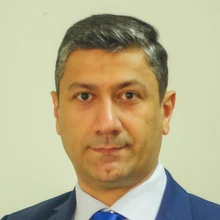Publications
TRIPP/Zangezur Corridor Must Serve both Peace and Connectivity
 By Vasif HUSEYNOV, PhD, Head of Department, AIR Center, Adjunct Lecturer, ADA and Khazar Universities, Baku By Vasif HUSEYNOV, PhD, Head of Department, AIR Center, Adjunct Lecturer, ADA and Khazar Universities, Baku
The Zangezur Corridor – recently rebranded as the Trump Route for International Peace and Prosperity (TRIPP) — has become one of the most discussed and debated infrastructure projects in Eurasia. Stretching 43 kilometres through Armenia’s Syunik Province, it promises to reconnect mainland Azerbaijan with its Nakhichevan exclave and, through Türkiye, to Europe. It is a project of logistics and trade — a corridor capable of shortening cargo transit from Asia to Europe from 18 days to 12 along the Middle Corridor, reducing dependency on maritime choke points, and creating new opportunities for growth across the South Caucasus. In practice, however, the TRIPP risks becoming a stage for geopolitical contestation unless regional actors ensure that its purpose remains economic, inclusive, and depoliticized. READ MORE
Publications
Is the India–China détente real?  By Shanthie Mariet D’SOUZA, PhD, founder & president, Mantraya Institute for Strategic Studies (MISS) By Shanthie Mariet D’SOUZA, PhD, founder & president, Mantraya Institute for Strategic Studies (MISS)
Existential differences and longstanding distrust make the current normalisation of relations deeply unstable.
This week (editor’s note: i.e. October 24- 28, 2025), India’s private airline Indigo flew one of its A320 planes from Kolkata to Guangzhou. It was the first direct flight from India to China in five years, following its halt during the Covid-19 pandemic and the souring of relations between the two neighbours in 2020 amid the border standoff that extended the freeze. In November, more flights, including Chinese carriers, will take to the sky, connecting New Delhi with Chinese cities. The resumption of direct air services is part of the increasing number of confidence-building measures undertaken by both countries to move past a history of distrust and adversarial relations. A détente is seemingly underway. However, on closer examination, the embrace appears more cautious and fragile. In recent months, both sides have unveiled more confidence-building measures. READ MORE
Publications
Russia’s Exclusion from Joint Caspian Drills Shows Regional Shift
 By Fuad SHAHBAZOV, Baku-based independent regional security and defence analyst By Fuad SHAHBAZOV, Baku-based independent regional security and defence analyst
On October 25, Azerbaijan participated in the Nusret-2025 Invitation Exercise, a joint military drill held in the Gulf of Soros in Türkiye. The exercise aimed to strengthen cooperation between the Turkish Naval Forces and the naval forces of friendly and allied countries, such as Azerbaijan. This is the latest example of Azerbaijan’s partnership with Türkiye in strengthening its naval forces. The Caucasus region, particularly the Caspian littoral, is emerging as a focal point of geopolitical competition amid rising tensions between Russia and the West. The Caspian, often referred to as a “Russian lake” during the Soviet era, has presented new challenges to Russia’s regional dominance since 2022. Until the 2020s, Russia remained the most powerful naval power in the Caspian Sea, despite Kazakhstan, Azerbaijan, and Iran systematically enhancing their naval capabilities over the past three decades. Russia’s full-scale invasion of Ukraine in 2022, as well as regional conflicts and reordering, have exacerbated Moscow’s declining leverage and hegemony in the South Caucasus and Central Asia. READ MORE
Publications
Azerbaijan-Russia: Frenemies Forever?  By Tabib HUSEYNOV, independent policy analyst and researcher By Tabib HUSEYNOV, independent policy analyst and researcher
Azerbaijan-Russia relations have experienced a series of compounding crises since early 2025, raising questions about the future of Russian influence in the South Caucasus. This paper examines the underlying causes and strategic consequences of this shift in bilateral relationship, highlighting the decline of Russia’s regional influence, alongside Azerbaijan’s emergence as a more autonomous and confident regional power. The paper argues that Azerbaijan’s evolving strategic posture, underpinned by its alliance with Türkiye, its central role in transregional connectivity projects, and its relative economic resilience, has empowered Baku to engage Moscow in a more assertive and transactional relationship. At the same time, areas of interdependence remain, particularly in trade, transport infrastructure, and close humanitarian-cultural contacts, posing both risks and opportunities. The paper concludes that the future of Azerbaijan-Russia relations will hinge on Moscow’s ability to internalize the new power realities in the South Caucasus.
READ MORE
Publications
How Azerbaijan Reshaped South Caucasus Geopolitics
 By Aytaс MAHAMMADOVA, Energy Security Expert affiliated with the Caspian-Alpine Society By Aytaс MAHAMMADOVA, Energy Security Expert affiliated with the Caspian-Alpine Society
The year 2020 marked a watershed moment in the modern history of the South Caucasus, a turning point that fundamentally altered the region's geopolitical landscape. Azerbaijan, after 30 years of patient diplomacy punctuated by military confrontations, took decisive initiative and made history. The 44-day war that autumn demonstrated not only Azerbaijan's military capabilities but also its strategic determination to resolve the protracted Karabakh conflict through force when diplomatic channels proved exhausted. This bold move transformed Azerbaijan from a passive player awaiting international mediation into an active architect of its own destiny and, by extension, the region's future. Azerbaijan’s post-Karabakh victory and subsequent strategic initiatives have positioned it firmly on the path to middle-power status. By leveraging its geographic location at the crossroads of Europe and Asia, its energy resources, and its growing diplomatic influence, Azerbaijan has demonstrated the ability to shape regional agendas beyond its immediate borders. READ MORE
Publications
Trump’s Bagram Claims and the Taliban’s Foreign Policy Choices  By Shanthie Mariet D’SOUZA, PhD, founder & president, Mantraya Institute for Strategic Studies (MISS) By Shanthie Mariet D’SOUZA, PhD, founder & president, Mantraya Institute for Strategic Studies (MISS)
On September 21, the Taliban rebuffed U.S. President Donald Trump for the second time in the last nine months. A day earlier, Trump had demanded control of Bagram air base in Afghanistan and had even threatened “bad things” if his demand wasn’t entertained. The Taliban spokesperson was categorical in his September 23 reply: “We will never agree to bargain away or hand over any part of our country.” On being summoned for an emergency meeting by Emir Hibatullah Akhunzada following Trump’s comments, Taliban defence and foreign ministers and intelligence chiefs rushed to Kandahar. There were separate meetings as well among the Taliban leadership. The recent rejection of Trump’s vague threats didn’t occur in a vacuum. READ MORE
Publications
Economic Implications of the Washington Declaration for Azerbaijan and Armenia
 By Aytaс Mahammadova, Energy Security Expert affiliated with the Caspian-Alpine Society By Aytaс Mahammadova, Energy Security Expert affiliated with the Caspian-Alpine Society
The Washington Declaration of August 2025 marks a turning point for the South Caucasus, unlocking unprecedented economic opportunities through peace, open borders, and the TRIPP corridor. Enhanced trade, investment, and energy cooperation promise regional integration, job creation, and sustainable growth, positioning Azerbaijan, and Armenia as key hubs in global value chains.
The historic Washington Declaration of August 8, 2025, represents a transformative moment not only for regional stability but for the economic prosperity of the entire South Caucasus region. The establishment of sustainable peace between these two nations unlocks unprecedented economic opportunities that extend far beyond the immediate benefits of ending hostilities, creating a foundation for long-term economic integration, infrastructure development, and regional cooperation that could serve as a model for conflict resolution worldwide. The economic dividends of peace are multifaceted, encompassing direct benefits from increased foreign investment, enhanced trade relationships, and the opening of previously closed borders, as well as indirect benefits from improved regional stability, and the ability to redirect resources from defence to productive economic activities. READ MORE
|
|